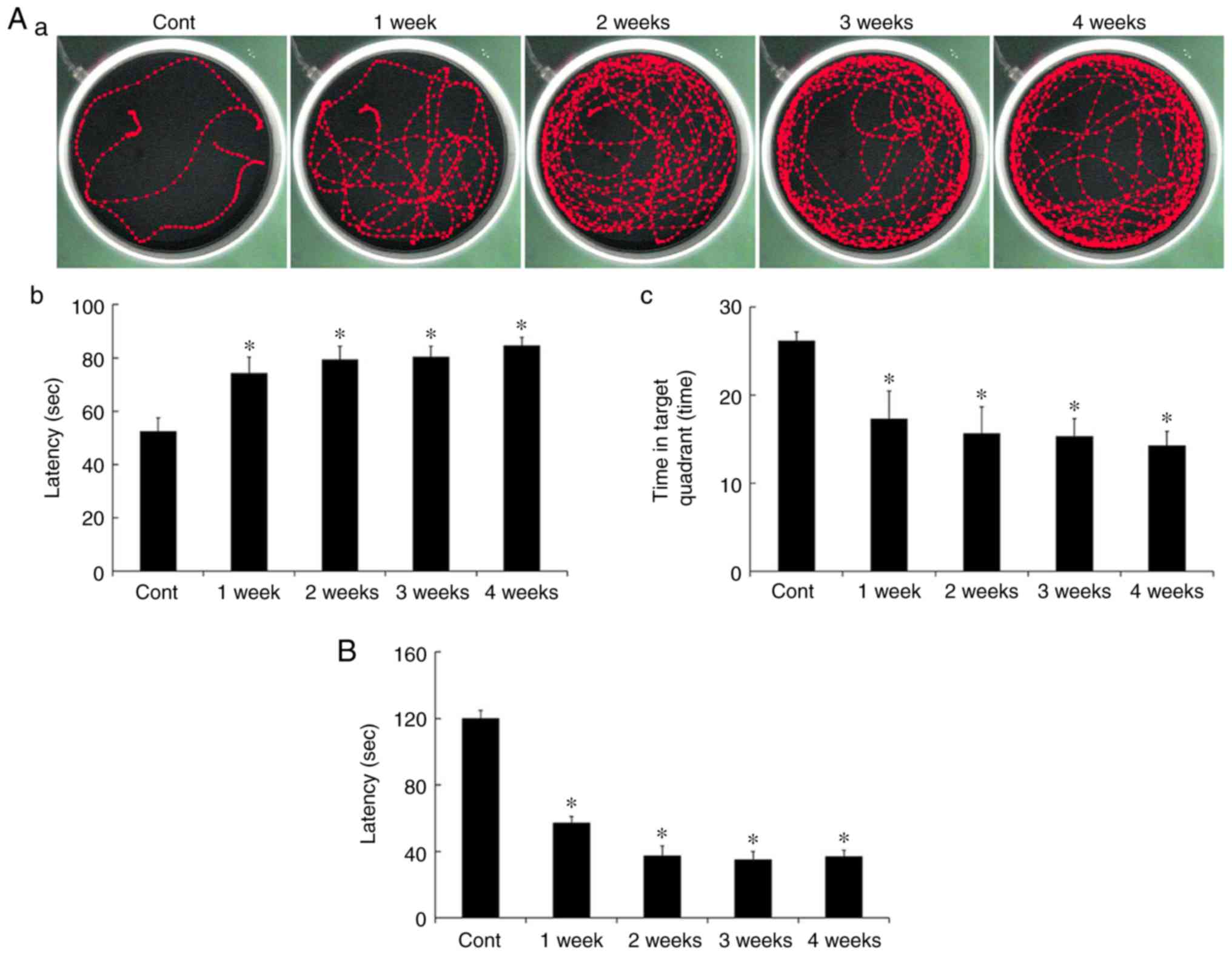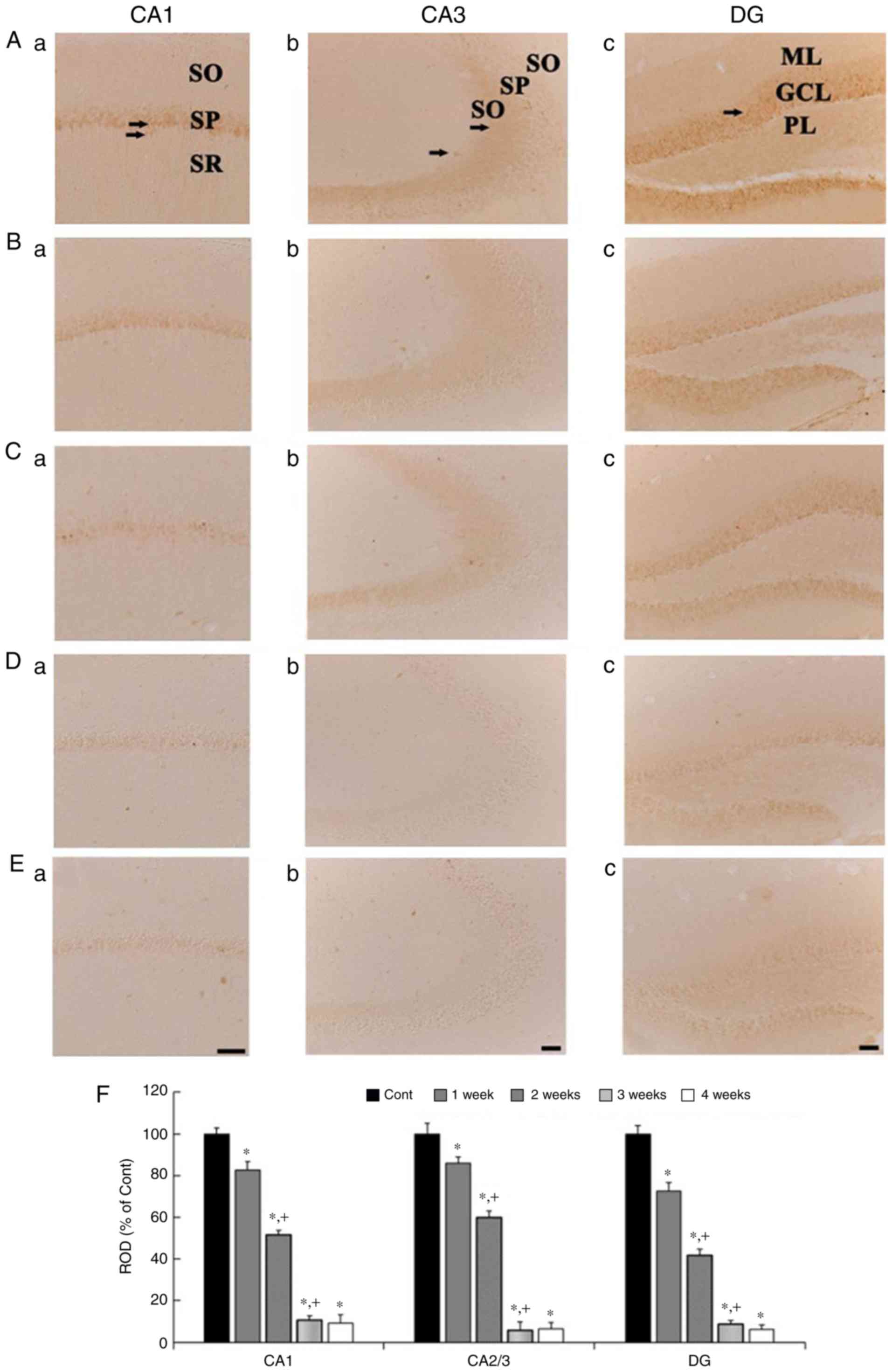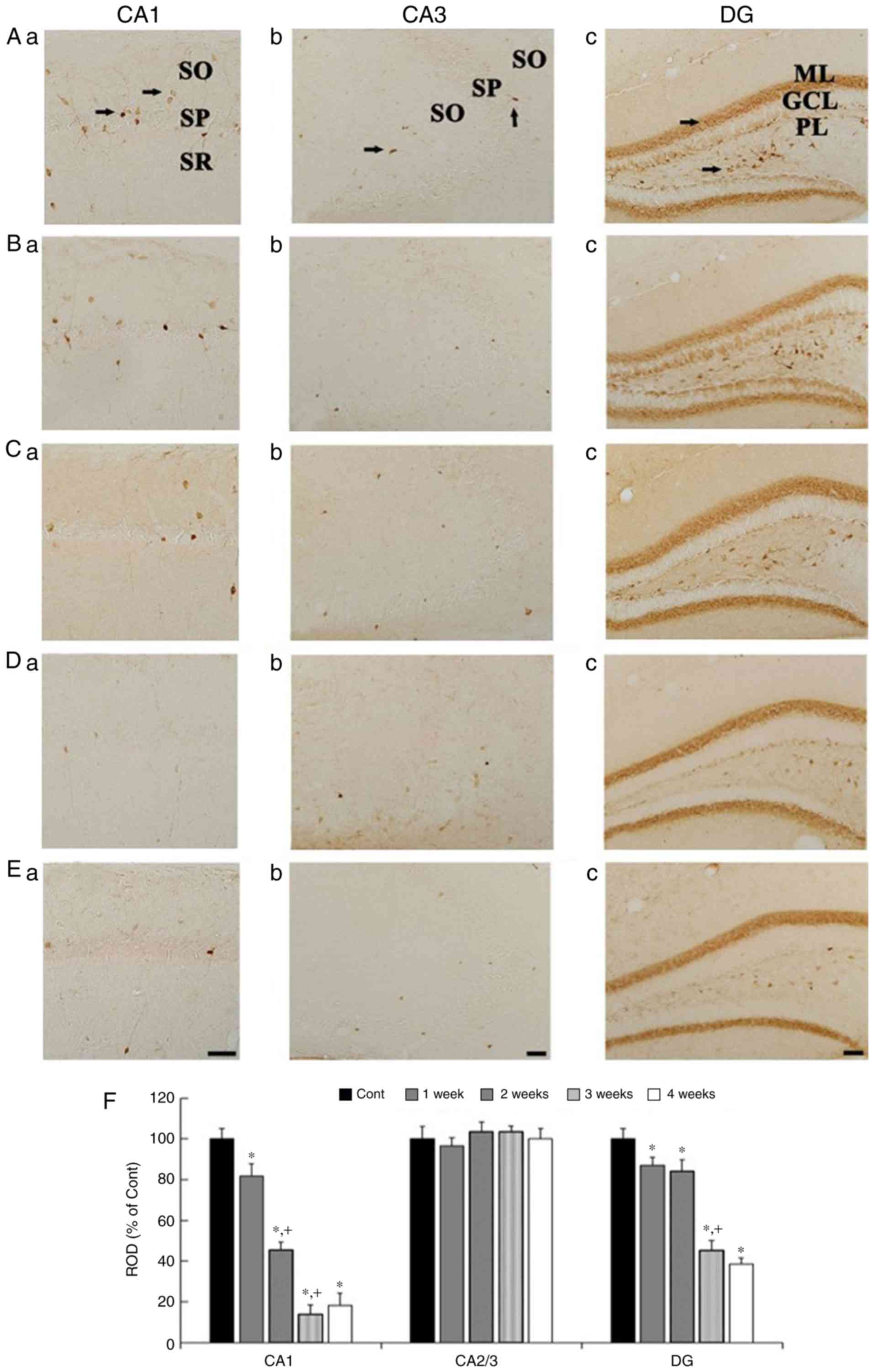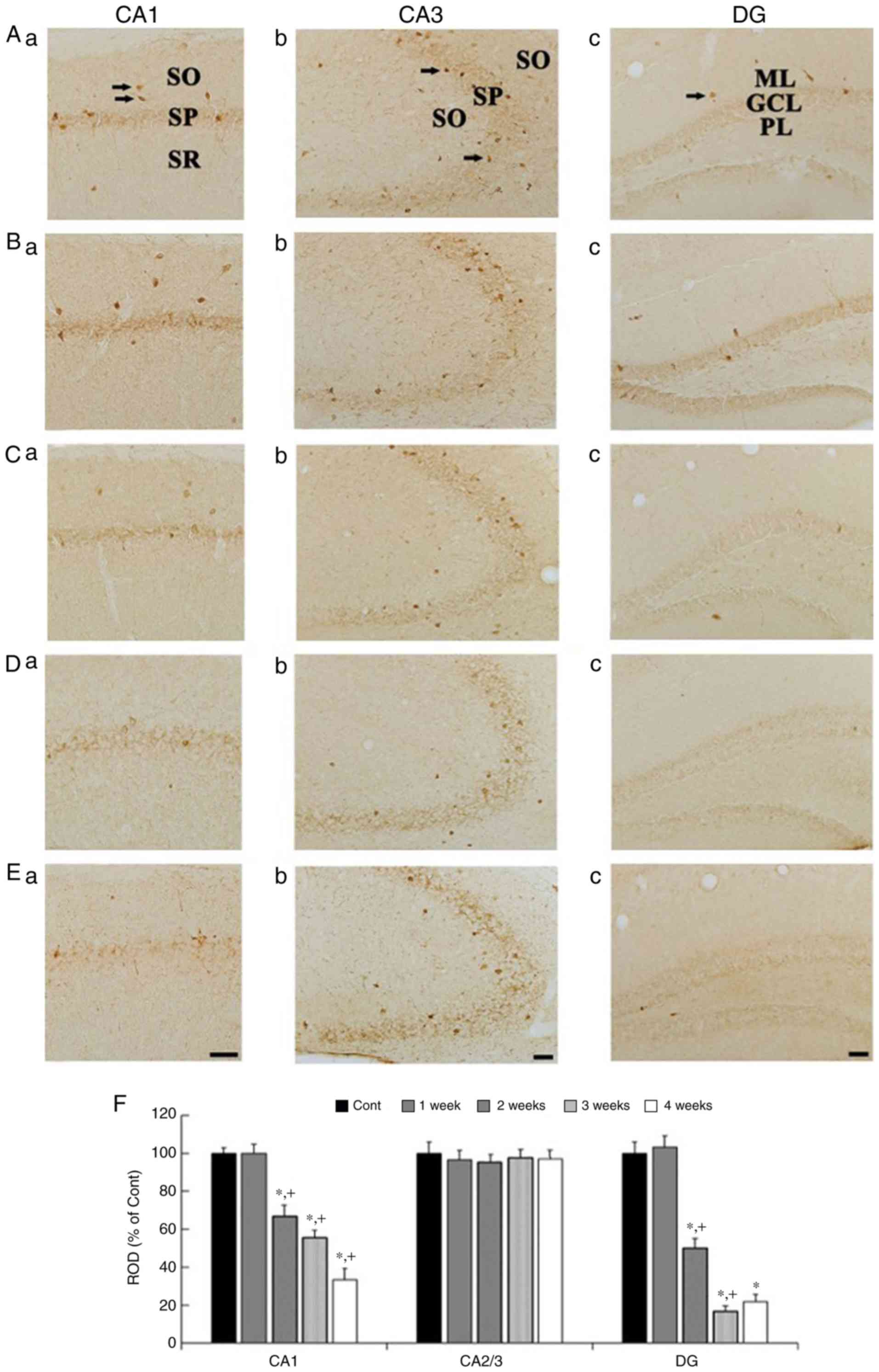|
1
|
Van der Zee EA and Luiten PG: Muscarinic
acetylcholine receptors in the hippocampus, neocortex and amygdala:
A review of immunocytochemical localization in relation to learning
and memory. Prog Neurobiol. 58:409–471. 1999. View Article : Google Scholar : PubMed/NCBI
|
|
2
|
Easton A, Douchamps V, Eacott M and Lever
C: A specific role for septohippocampal acetylcholine in memory?
Neuropsychologia. 50:3156–3168. 2012. View Article : Google Scholar : PubMed/NCBI
|
|
3
|
Alreja M, Wu M, Liu W, Atkins JB, Leranth
C and Shanabrough M: Muscarinic tone sustains impulse flow in the
septohippocampal GABA but not cholinergic pathway: Implications for
learning and memory. J Neurosci. 20:8103–8110. 2000.PubMed/NCBI
|
|
4
|
Wu M, Shanabrough M, Leranth C and Alreja
M: Cholinergic excitation of septohippocampal GABA but not
cholinergic neurons: Implications for learning and memory. J
Neurosci. 20:3900–3908. 2000.PubMed/NCBI
|
|
5
|
Pascual M, Pérez-Sust P and Soriano E: The
GABAergic septohippocampal pathway in control and reeler mice:
Target specificity and termination onto Reelin-expressing
interneurons. Mol Cell Neurosci. 25:679–691. 2004. View Article : Google Scholar : PubMed/NCBI
|
|
6
|
Gulyás A, Seress L, Tóth K, Acsády L,
Antal M and Freund TF: Septal GABAergic neurons innervate
inhibitory interneurons in the hippocampus of the macaque monkey.
Neuroscience. 41:381–390. 1991. View Article : Google Scholar : PubMed/NCBI
|
|
7
|
Acsády L, Halasy K and Freund TF:
Calretinin is present in non-pyramidal cells of the rat
hippocampus-III. Their inputs from the median raphe and medial
septal nuclei. Neuroscience. 52:829–841. 1993. View Article : Google Scholar : PubMed/NCBI
|
|
8
|
Tóth K, Borhegyi Z and Freund TF:
Postsynaptic targets of GABAergic hippocampal neurons in the medial
septum-diagonal band of broca complex. J Neurosci. 13:3712–3724.
1993.PubMed/NCBI
|
|
9
|
Mattson MP: Calcium and neurodegeneration.
Aging Cell. 6:337–350. 2007. View Article : Google Scholar : PubMed/NCBI
|
|
10
|
Foster TC: Calcium homeostasis and
modulation of synaptic plasticity in the aged brain. Aging Cell.
6:319–325. 2007. View Article : Google Scholar : PubMed/NCBI
|
|
11
|
Zhang ZJ and Reynolds GP: A selective
decrease in the relative density of parvalbumin-immunoreactive
neurons in the hippocampus in schizophrenia. Schizophr Res.
55:1–10. 2002. View Article : Google Scholar : PubMed/NCBI
|
|
12
|
Hwang IK, Nam YS, Chung DW, Lee HS, Yoon
YS, Yoo KY, Kang TC, Lee IS and Won MH: Changes in the expression
of calbindin D-28k in the gerbil hippocampus following seizure.
Neurochem Int. 44:145–152. 2004. View Article : Google Scholar : PubMed/NCBI
|
|
13
|
Reynolds GP, Abdul-Monim Z, Neill JC and
Zhang ZJ: Calcium binding protein markers of GABA deficits in
schizophrenia-postmortem studies and animal models. Neurotox Res.
6:57–61. 2004. View Article : Google Scholar : PubMed/NCBI
|
|
14
|
Holmes GL, Yang Y, Liu Z, Cermak JM,
Sarkisian MR, Stafstrom CE, Neill JC and Blusztajn JK:
Seizure-induced memory impairment is reduced by choline
supplementation before or after status epilepticus. Epilepsy Res.
48:3–13. 2002. View Article : Google Scholar : PubMed/NCBI
|
|
15
|
Yan BC, Park JH, Chen BH, Cho JH, Kim IH,
Ahn JH, Lee JC, Hwang IK, Cho JH, Lee YL, et al: Long-term
administration of scopolamine interferes with nerve cell
proliferation, differentiation and migration in adult mouse
hippocampal dentate gyrus, but it does not induce cell death.
Neural Regen Res. 9:1731–1739. 2014. View Article : Google Scholar : PubMed/NCBI
|
|
16
|
Onaolapo OJ, Onaolapo AY, Abiola AA and
Lillian EA: Central depressant and nootropic effects of daytime
melatonin in mice. Ann Neurosci. 21:90–96. 2014. View Article : Google Scholar : PubMed/NCBI
|
|
17
|
Doguc DK, Delibas N, Vural H, Altuntas I,
Sutcu R and Sonmez Y: Effects of chronic scopolamine administration
on spatial working memory and hippocampal receptors related to
learning. Behav Pharmacol. 23:762–770. 2012. View Article : Google Scholar : PubMed/NCBI
|
|
18
|
Yoo DY, Kim W, Lee CH, Shin BN, Nam SM,
Choi JH, Won MH, Yoon YS and Hwang IK: Melatonin improves
D-galactose-induced aging effects on behavior, neurogenesis, and
lipid peroxidation in the mouse dentate gyrus via increasing pCREB
expression. J Pineal Res. 52:21–28. 2012. View Article : Google Scholar : PubMed/NCBI
|
|
19
|
Ahn JH, Choi JH, Park JH, Kim IH, Cho JH,
Lee JC, Koo HM, Hwangbo G, Yoo KY, Lee CH, et al: Long-term
exercise improves memory deficits via restoration of myelin and
microvessel damage, and enhancement of neurogenesis in the aged
gerbil hippocampus after ischemic stroke. Neurorehabil Neural
Repair. 30:894–905. 2016. View Article : Google Scholar : PubMed/NCBI
|
|
20
|
Bae EJ, Chen BH, Shin BN, Cho JH, Kim IH,
Park JH, Lee JC, Tae HJ, Choi SY, Kim JD, et al: Comparison of
immunoreactivities of calbindin-D28k, calretinin and parvalbumin in
the striatum between young, adult and aged mice, rats and gerbils.
Neurochem Res. 40:864–872. 2015. View Article : Google Scholar : PubMed/NCBI
|
|
21
|
Park JH, Choi HY, Cho JH, Kim IH, Lee TK,
Lee JC, Won MH, Chen BH, Shin BN, Ahn JH, et al: Effects of chronic
scopolamine treatment on cognitive impairments and myelin basic
protein expression in the mouse hippocampus. J Mol Neurosci.
59:579–589. 2016. View Article : Google Scholar : PubMed/NCBI
|
|
22
|
Givens B and Olton DS: Bidirectional
modulation of scopolamine-induced working memory impairments by
muscarinic activation of the medial septal area. Neurobiol Learn
Mem. 63:269–276. 1995. View Article : Google Scholar : PubMed/NCBI
|
|
23
|
Chen BH, Park JH, Kim DW, Park J, Choi SY,
Kim IH, Cho JH, Lee TK, Lee JC, Lee CH, et al: Melatonin improves
cognitive deficits via restoration of cholinergic dysfunction in a
mouse model of scopolamine-induced amnesia. ACS Chem Neurosci. Sep
27–2017.(Epub ahead of print). View Article : Google Scholar
|
|
24
|
Soontornniyomkij V, Risbrough VB, Young
JW, Soontornniyomkij B, Jeste DV and Achim CL: Hippocampal
calbindin-1 immunoreactivity correlate of recognition memory
performance in aged mice. Neurosci Lett. 516:161–165. 2012.
View Article : Google Scholar : PubMed/NCBI
|
|
25
|
Van der Zee EA and Luiten PG: GABAergic
neurons of the rat dorsal hippocampus express muscarinic
acetylcholine receptors. Brain Res Bull. 32:601–609. 1993.
View Article : Google Scholar : PubMed/NCBI
|
|
26
|
Van der Zee EA, de Jong GI, Strosberg AD
and Luiten PG: Parvalbumin-positive neurons in rat dorsal
hippocampus contain muscarinic acetylcholine receptors. Brain Res
Bull. 27:697–700. 1991. View Article : Google Scholar : PubMed/NCBI
|


















